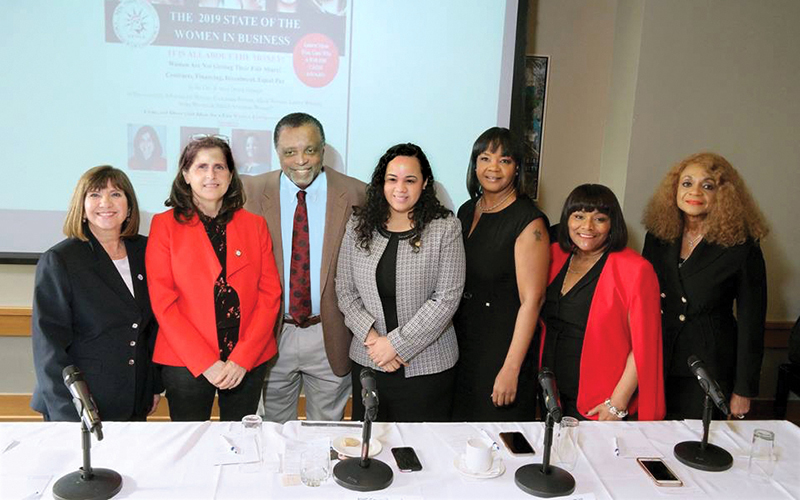
NYWCC hosts annual State of Women in Business breakfast

Photo credit: John Caballero.
New York, NY On March 15th, the New York Women’s Chamber of Commerce (NYWCC) hosted its annual State of Women in Business breakfast at the Faculty House of Columbia University. Subtitled, “It is all about the money!” the interchange explored issues of gender pay disparity before an audience comprised largely of women business owners who addressed the panelists: NYC councilmember District 6 Helen Rosenthal, who also chairs the women’s committee; NYC deputy mayor Phillip Thompson III; NYS assemblywoman District 72 Carmen De La Rosa; and TaylorMade Contracting LLC CEO Joycelyn Taylor. Chair of the NYWCC, Lina Gottesman, president of Altus Marble, Metal & Wood, served as moderator. NYWCC board member and Realtor Eugenia Foxworth announced NYWCC’s new cash competition for members only, Fundher.
NYWCC president Quenia Abreu said, “Women entrepreneurs need money to grow their businesses. Access to capital continues to be the Number 1 barrier women face when trying to grow their business and we are trying to change that with FundHER - it will give women entrepreneurs access to money!”
Vera Moore, NYWCC board member and president of Vera Moore Cosmetics, launched the symposium, noting the NYWCC’s support of Women’s History Month and economic advancement for women entrepreneurs.
Gottesman echoed the NYWCC’s dedication to economically empowering women business owners, paving a direct path to gender equality.
“Women are still not getting their fair share in business,” said Gottesman, adding that women start businesses at a 34% lower revenue rate and the ‘old boys’ network’ still circumvents inclusion.
Deputy mayor Thompson spoke of women’s historic disenfranchisement and the need for “a fundamental change” which will be “revolutionary – changing the way our country is structured.”
Thompson noted the imminent effect of the 2021 closing of Indian Point and the resulting energy reduction, prompting Rosenthal to urge MWBEs to be ready to bid on retrofitting contracts.
An audience member spoke of the change from mandated participation by MWBEs and WBEs in government contracts to more elusive ‘goals.’
Rosenthal said we need to look not only at ways women and people of color are held back, but at how the City can help “move us forward.” She urged all to change the City’s charter and vote for the pre-payment option.
De La Rosa said, “We’re still not equal” and we need to “empower a community, not play the system.”
She spoke of the “obstacles and hurdles” faced to become certified and that cross certification for the City and state might help “streamline and create a pipeline.”
“If our leaders do not represent us, they will not represent us,” she said.
“We’re at a pivotal moment,” said Taylor, noting the low numbers of MWBE participation in government contracts and stressed the City’s obligation to engage with firms on hiring MWBEs.
“The City can’t be built on the backs of women and minority-owned businesses…We have to have honest conversations and be willing to make real changes,” said Taylor.
Noting the many uncertified women and minority-owned businesses, Gottesman said, “We need to reach out to all the businesses …to have a far larger community to contact.” She pointed out the difficulties in competing with out-of-state companies and big business.
Jonell Doris, senior advisor and director of NYC’s Mayor’s Office of Minority and Women-Owned Businesses, a past NYWCC panelist, said, “We’ll help facilitate the process. That’s why we’re here today.”
Rosenthal said, “The light at the end of the tunnel is coming.”